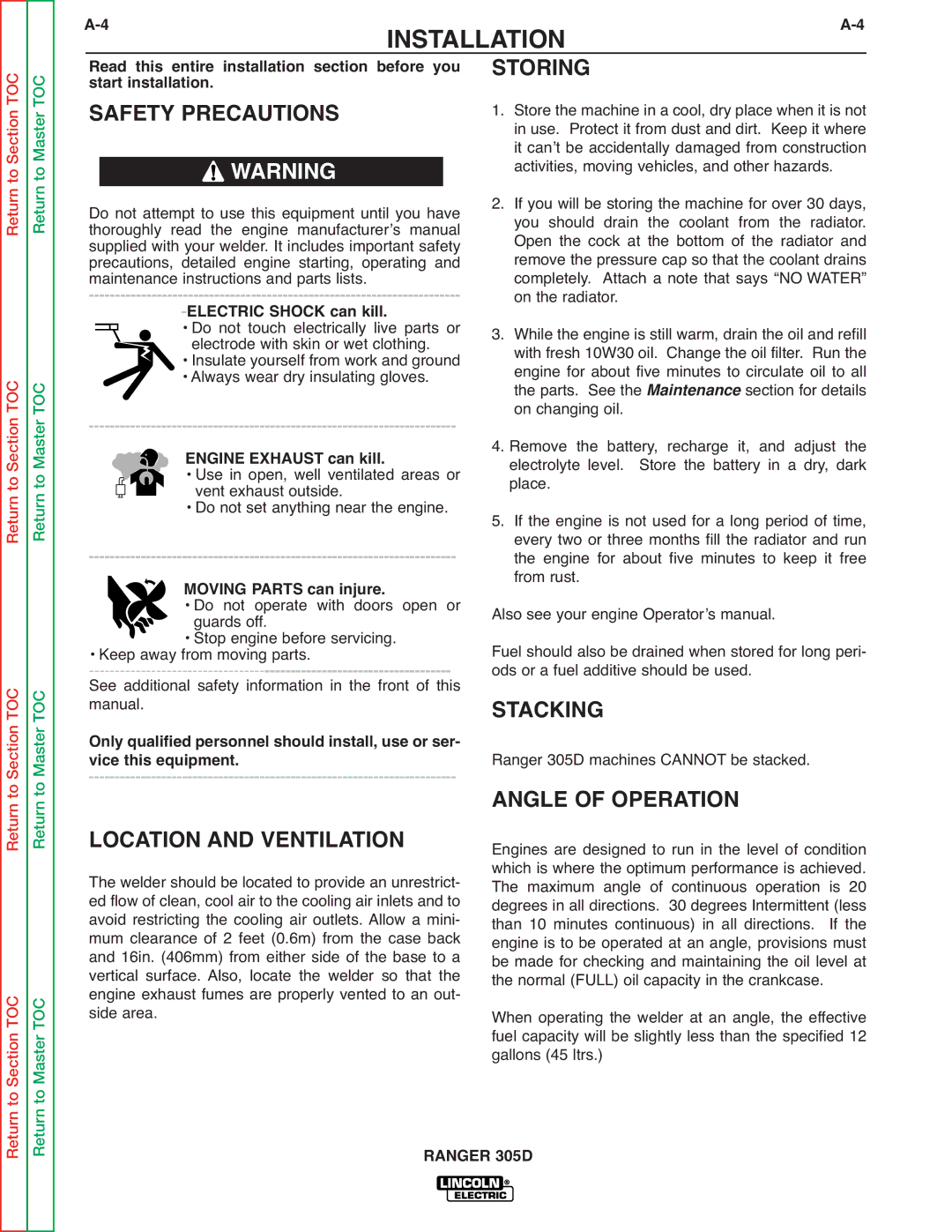
Return to Section TOC
Return to Section TOC
Return to Section TOC
Return to Section TOC
Return to Master TOC
Return to Master TOC
Return to Master TOC
Return to Master TOC
INSTALLATION | |||||||
start installation. | STORING |
| |||||
Read this entire installation section before you | in use. Protect it from dust and dirt. Keep it where | ||||||
SAFETY PRECAUTIONS | |||||||
|
|
|
|
| 1. Store the machine in a cool, dry place when it is not | ||
|
|
| WARNING |
| it canʼt be accidentally damaged from construction | ||
|
|
|
| activities, moving vehicles, and other hazards. | |||
Do not attempt to use this equipment until you have | 2. If you will be storing the machine for over 30 days, | ||||||
thoroughly read the engine manufacturerʼs manual | you should drain the coolant from the radiator. | ||||||
supplied with your welder. It includes important safety | Open the cock at the bottom of the radiator and | ||||||
precautions, detailed engine starting, operating and | remove the pressure cap so that the coolant drains | ||||||
maintenance instructions and parts lists. | completely. Attach a note that says “NO WATER” | ||||||
on the radiator. |
| ||||||
|
|
|
|
| |||
|
|
| • Do not touch electrically live parts or | 3. While the engine is still warm, drain the oil and refill | |||
|
|
| electrode with skin or wet clothing. | with fresh 10W30 oil. Change the oil filter. Run the | |||
|
|
| • Insulate yourself from work and ground | engine for about five minutes to circulate oil to all | |||
|
|
| • Always wear dry insulating gloves. | the parts. See the Maintenance section for details | |||
on changing oil. |
| ||||||
4. Remove the battery, recharge it, and adjust the | |||||||
|
|
| ENGINE EXHAUST can kill. | ||||
|
|
| • Use in open, well ventilated areas or | electrolyte level. Store the battery in a dry, dark | |||
|
|
| vent exhaust outside. | place. |
| ||
|
|
| • Do not set anything near the engine. | 5. If the engine is not used for a long period of time, | |||
|
|
| |||||
every two or three months fill the radiator and run | |||||||
the engine for about five minutes to keep it free | |||||||
|
|
| MOVING PARTS can injure. | from rust. |
| ||
|
|
| • Do not operate with doors open or | Also see your engine Operatorʼs manual. |
| ||
|
|
| guards off. |
| |||
|
|
| • Stop engine before servicing. | Fuel should also be drained when stored for long peri- | |||
• Keep away from moving parts. | |||||||
ods or a fuel additive should be used. |
| ||||||
STACKING |
| ||||||
Only qualified personnel should install, use or ser- |
| ||||||
manual. |
|
|
|
| |||
vice this equipment. | Ranger 305D machines CANNOT be stacked. |
| |||||
ANGLE OF OPERATION |
| ||||||
LOCATION AND VENTILATION |
| ||||||
Engines are designed to run in the level of condition | |||||||
The welder should be located to provide an unrestrict- | which is where the optimum performance is achieved. | ||||||
The maximum angle of continuous operation is 20 | |||||||
ed flow of clean, cool air to the cooling air inlets and to | degrees in all directions. 30 degrees Intermittent (less | ||||||
avoid restricting the cooling air outlets. Allow a mini- | than 10 minutes continuous) in all directions. | If the | |||||
mum clearance of 2 feet (0.6m) from the case back | engine is to be operated at an angle, provisions must | ||||||
and 16in. (406mm) from either side of the base to a | be made for checking and maintaining the oil level at | ||||||
vertical surface. Also, locate the welder so that the | the normal (FULL) oil capacity in the crankcase. |
| |||||
engine exhaust fumes are properly vented to an out- |
| ||||||
side area. |
|
| When operating the welder at an angle, the effective | ||||
|
|
|
|
| fuel capacity will be slightly less than the specified 12 | ||
|
|
|
|
| gallons (45 ltrs.) |
| |
RANGER 305D
